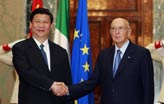China's top goal: Making the yuan the standard
Updated: 2011-06-10 10:44
By Zhang Ming (China Daily European Weekly)
 |
Offshore yuan-denominated bonds - a plank in China's drive to internationalize its currency - will speed up the economy's growth rate as an increasing number of financial institutions roll out yuan-denominated products in Hong Kong.
The World Bank has issued its first yuan-denominated bond in January in Hong Kong to raise 500 million yuan (52.6 million euros) from the two-year bond issue on Hong Kong's yuan-denominated bond market.
This move is symbolic because it will help China as it tries to increase the use of its currency in global markets.
The reason why the World Bank chose Hong Kong to issue yuan bonds is because the cost of funding there is ultra-cheap - hundreds of basis points lower than on the mainland.
The abundant liquidity and the comparatively lower interest rates in Hong Kong are two reasons for the World Bank to issue the yuan bond. The bonds enjoy a coupon of 0.95 percent on lending rates. This is even lower than the lending rate in November last year when the Ministry of Finance issued the yuan-denominated bonds in Hong Kong.
In December, VTB Bank, Russia's second-biggest bank, issued a three-year, yuan-denominated bonds in Hong Kong with the yield of 2.95 percent. In the same year, the bank issued a five-year, euro-dollar bonds with the lending rate of 6.47 percent. Although issuers will face risks due to the yuan's appreciation, if the World Bank fund is used in China, there won't be any risks.
After the global financial crisis, the Chinese government seems to fully understand the risks of an over-reliance on the dollar and has decided to build a new international financial strategy, which is to reform the international monetary system, the monetary cooperation in East Asia and internationalize of the yuan. Its internationalization has become the top priority of the new strategy.
The Chinese government has been seeking to internationalize the yuan in two ways. First, China is continuously exporting yuan, which involves encouraging enterprises to use the yuan in transactions. Despite the global success of Chinese exporters, the yuan plays only a minor international role because it cannot be freely exchanged for other currencies. And official controls make it difficult to move the yuan in and out of China. But in July 2009, China successfully ran a pilot program of cross-border trade using the yuan.
Total cross-border yuan transactions reached $70.6 billion (48.1 billion euros) in the first half of last year, 20 times the figure in the second half of 2009. The achievement was made after the central bank expanded a pilot project allowing Chinese and foreign companies to settle trade transactions in yuan since June 2010.
The central bank has also helped foreign traders receive funds in yuan when it signed a total of 803.5 billion yuan for bilateral currency exchanges with South Korea, Hong Kong, Malaysia, Belarus, Indonesia, Argentina, Iceland, Singapore and other countries and regions.
The second method is to provide more yuan-denominated financial products to foreign investors, which includes issuing offshore yuan-denominated products in Hong Kong and further opening the yuan financial market to overseas investors.
The former is mainly about yuan bonds in Hong Kong and the latter is about opening the domestic inter-bank bond market to foreign investors.
The offshore yuan-denominated bonds are slowly gaining traction with multinationals and with the majority of Chinese operations. McDonald's, the fast-food chain, became the first United States issuer last August when it raised 200 millon yuan. Caterpillar, the US-based designer and manufacturer of machinery, later issued a 1-billion-yuan bond in November in Hong Kong.
According to statistics, as of the end of 2010, 43 offshore yuan-denominated bonds have been released in Hong Kong for 59 billion yuan. Only in 2010, the issuance of yuan-denominated bonds in Hong Kong amounted to as much as 30 billion yuan. According to estimates from HSBC Bank, that will increase to 80 billion yuan by 2011.
The foundation to support the rapid expansion of the yuan-denominated bond market in Hong Kong are the increasing yuan deposits in Hong Kong. Yuan deposits were only 63 billion yuan at the end of 2009. At the end of November 2010, this has soared to 280 billion yuan. According to Deutsche Bank estimates, at the end of 2013, yuan deposits in Hong Kong will reach 2 trillion yuan. Investors in Hong Kong will continue pursuing yuan-denominated bonds since interest rates are low and the yuan is expected to appreciate.
The rapid development of the offshore yuan bond market in Hong Kong will bring a win-win situation for both the mainland and Hong Kong. For the mainland, to develop offshore yuan financial markets, the government should regionalize the yuan. For Hong Kong, faced by the aggressive competition from Shanghai, it should develop an offshore yuan financial center to maintain its status as the international financial center.
The Chinese government should also continue to expand the use of "panda bonds", where foreign institutions and enterprises issue yuan bonds on the mainland. In the future, these bonds will be the dual engine that will internationalize the yuan.
The author is a scholar with the Chinese Academy of Social Sciences.
E-paper

Harbin-ger of change
Old industrial center looks to innovation to move up the value chain
Preview of the coming issue
Chemical attraction
The reel Mao
Specials

Vice-President visits Italy
The visit is expected to lend new impetus to Sino-Italian relations.

Birthday a new 'starting point'
China's national English language newspaper aims for a top-notch international all-media group.

Sky is the limit
Chinese tycoon conjures up green dreams in Europe with solar panels
